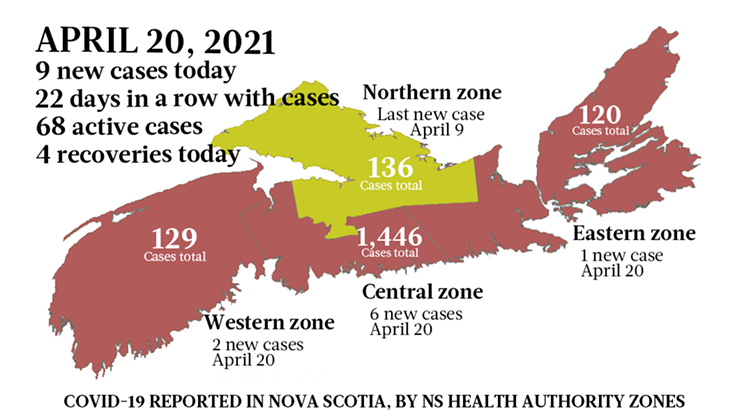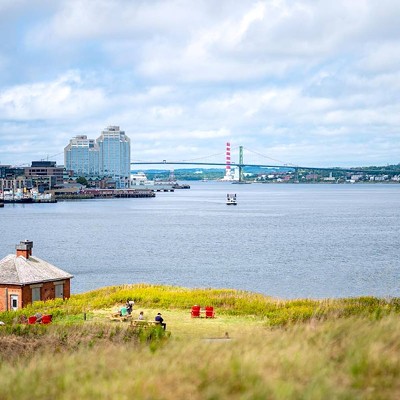On Thursday morning at 8am, Nova Scotia’s borders will shut tighter than they have since the beginning of the pandemic. The cause is a combination of increasing cases, an uptick in cross-border travel and possible community spread.
As of Wednesday, Nova Scotia has 79 active COVID-19 cases—some are easily explained (40 percent are a combination of rotational workers and temporary foreign workers) but others are a mystery. “In light of the rising cases related to travel in the province, we have decided to restrict non-essential travel into Nova Scotia,” said premier Iain Rankin on Tuesday, at the regular COVID-19 press conference with top doc Robert Strang.
The restrictions include a ban on anyone entering the province to live or work here if they’ve purchased a home or signed a lease after April 21. Strang said these people will be forced to quarantine at their point of entry or to book a return flight at their own cost, depending on the situation.
“If you purchased the place before April 21 you can come here,” he said Tuesday. “But we’re telling people that now is not the time to be looking to purchase something in Nova Scotia for the next four weeks and anticipate you can move here.”
Strang said there will be a case-by-case appeal process—the details of which are still in the works—but “this is a critical time for us to cut off travel-related cases at the source.”
That source includes some recent visitors who didn’t isolate properly, and the Nova Scotians who should’ve known better than to socialize with them. “Please do not socialize with family and friends who are meant to be quarantining,” said Strang. “One of our current clusters was a result of family and friends gathering with people who had recently come from Ontario.”
There are, however, many exceptions to the rule that are deemed “essential travel,” including temporary foreign workers, rotational workers and post-secondary students. The full list of exceptions that are considered essential can be found in the release from the government. “Given that the pandemic is now being driven by variants that transmit more easily, this strong action is necessary to protect Nova Scotians,” Rankin said.
But even for some of these exceptions, the rules have changed. Rotational workers must now isolate from their families until they get a negative test back, and pretty much every other group allowed entry will have to isolate for two weeks—there are already specialized protocols for child custody agreements, travel for legal proceedings and university student pickups.
Strang said there will be fewer compassionate exceptions to travel restrictions during the next four weeks. “This means that people will not be allowed to travel to Nova Scotia from outside Atlantic Canada for funerals, and only in exceptional circumstances for end-of-life visits.” And specialized workers will only be allowed for what the government deems “critical infrastructure work.”
The province said it technically can’t turn away permanent residents coming home from travel, but they would all be forced to quarantine for the full 14 days.
“To everyone else, we are saying do not travel to Nova Scotia at this time,” said Strang. “If you come here and your travel is non-essential, you will be turned away.” To seasonal travellers, Strang said, “do not come until May 20 at the earliest.”
The big exception to the new restrictions at the border are people coming from PEI and Newfoundland and Labrador, who are still allowed through. On the return trip, however, they’ll have to quarantine for two weeks. The Atlantic bubble of unfettered travel between east coast provinces didn’t open last Monday, April 19 as planned; the potential start date was pushed just two weeks, to May 3, but Tuesday Rankin said that date is “clearly not going to happen.”
Other premiers agree. “Given present conditions in the region and elsewhere in Canada, Premiers will also consider dates later in May 2021 for reducing travel restrictions," says a release from the Council of Atlantic Premiers on Tuesday evening.
All in all, Nova Scotia’s rules are set to last until at least May 20, a full month from when they were implemented. Strang says the goal is to find out whether we have community spread, and stop the spread from travel in the meantime.
“This is a temporary measure that will extend for four weeks, but if we need to we will extend this time and put further restrictions in place,” he said. Rankin added, “When doctor Strang and I are confident that cases are under control, we can make an adjustment.”



















